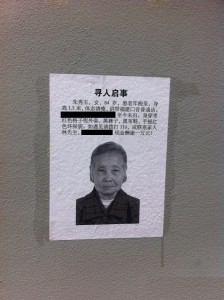
The Truth behind dementia in China – even today.
Whilst Caron Cares exists primarily to share information to help you care for someone elderly , there are occasions when I just want to share something with you. This is one such time but I warn you, you will be shocked and saddened.
This made me cry, please appreciate that although poor in places we do have better care for loved ones with dementia than other parts of the world.
With Thanks to Bromme Hampton Cole CEO of Hampton Heorter Cole for allowing me to share this. Bromme likes the dementia assistance cards I have developed and is having them translated into Chinese and they are being distributed at the Care Expo in Shanghai in November.
XiuYu’s Epitaph

Meet Zhu XiuYu whom I know only from this photo. It is a report of a missing person, which I found taped to a telephone pole. XiuYu as I will call her, is 84 years old and for three years spent most of her day sitting on the sidewalk, tethered to a stake hammered into the ground next to her daughter’s small restaurant of 2 tables and 8 seats on Jian guo Lu, located in a dusty southeast Shanghai neighborhood. XiuYu’s exact diagnosis was not known but she had profound memory loss; she recognized no one, was mistrustful and at times, hostile. Sometime between breakfast and lunch on the day she disappeared, XiuYu freed herself from the tether, removed her shoes and walked away…quietly, unnoticed and forever.
Her daughter, Xicen, is bereft. She closed her restaurant and for two weeks hiked all over Shanghai, frantically searching for her mother. Her bruised and blistered feet bear witness to her hunt. Breathless with desperation…she cried out her mother’s name at every corner, choking on tears, pacing street after street after street. In the past few days Xicen has given into despair and is resigned to never see her mother again. Her inquires at the local police produced little more than indifference. She is overwhelmed with grief and crumbles into tears spontaneously, sobbing over her cold stove, holding a picture of her mother to her heaving chest. Her anguish has torn her apart.
Xicen is 45 and XiuYu’s only daughter. In turn, she was her mother’s only care giver and source of support. Xicen never married and, consequently, is known in Chinese society as one of the millions of “left-over women”. They are poor and the last in line to benefit from the Chinese economic miracle. Neither of them went to university and they rely entirely on the state for every service imaginable.
Years ago when XiuYu’s disorientation began, Xicen took her to the hospital seeking an appointment; four months later she saw a Doctor. The results were inconclusive; the Doctor was unsure and hesitant to recommend the common treatment: powerful sedatives. Besides, there was no available bed at the local hospital. Yet from Xicen’s perspective, XiuYu’s weakening memory was not in doubt. Over the next 3 years, XiuYu dissolved rapidly. Xicen attempted other visits to the hospital and was repeatedly told that the waiting list was long for beds in the ward that kept old people with “lao nian chi dai” the common term for dementia that translates harshly into “old people’s idiotic behavior”.
In an effort to understand the realities here in China of those who suffer from dementia and how their families cope I spoke with Xicen at length. Much of what she said was not surprising, however the outcome was terrifying. She describes her mother’s decline in visibly traumatic terms. She lurches back and forth as if in a trance. Xicen reaches out with her left arm; her hand opens and shuts, grasping nothing but air as if she were stretching to save her mother from the pull of some monstrous tide. Xicen details the separation painfully as her mother drifted further and further towards a horizon of liminal recognition. Xicen recalls the point of no return… she sits up abruptly, her face white with shock and eyes in an empty stare, she declares…, “Then on that day, she did not recognize me anymore. I was no longer her daughter and she was not my mother.” Xicen lowers her head, she has no more tears only remorse. She is silent and alone.
Xicen is mystified at her horrifying misfortune. Her mother’s disease was painful enough, indeed for both, but now XiuYu has vanished into a city of 22 million and likely has met her end or soon will. It is a virtual certainty Xicen will never know her mother’s fate. Though no official records exist, hundreds of old people go missing each month; a few are found and those within a day or two at most. But after three weeks the chances are nil of reunion much less recovery. Many expire from dehydration, some are victims to hit and run car accidents, a few throw themselves into the foul Huangpu River and others fall prey to more unspeakable crimes.
I leave Xicen’s restaurant and walk out into the hot August sun. To one side of the restaurant lay XiuYu’s tether twisted about a massive, crude stake driven into the ground. It’s flat, round top has sharp edges and its wide diameter prevented the tether from being pulled off. I bend over and look at the tether. I can see frayed ends…and deduce that XiuYu used the stake’s sharp edges to saw the nylon rope in two. She was desperate to escape. I stand up and step back to take in the whole scene before I leave. On the ground near the stake, scattered about in a trivial way, are XiuYu’s last earthy possessions: a pair of old shoes, a plastic feed bowl and an umbrella to protect her from the sun. To Western sensitivities this is inhumane, but in the context of Xicen’s reality and the health care support system available to her, I can understand why this happened.
The sight is unbearably pathetic; I walk to the end of the street where I purchase a cardboard box. I return to the stake and collect XiuYu’s meager belongings: I brush the dust off her shoes, shake the umbrella and wipe out the bowl as best I can. I then arrange them carefully in the box and reflect on XiuYu as I close the lid: She was a woman who was no stranger to chaos, born into the unceasing madness of mid-century China, she lived a life of severe transformation and her reward was to be her daughter’s prisoner, robbed of her sanity, dying a cruel death. XiuYu never knew peace and was exhausted with this world. I wonder, if in some fleeting moment of agonizing clarity, she severed her tether knowing it would free her from this life. I stay for a moment, standing next to the contorted tether and stake wondering if this is the end of XiuYu’s story. With the exception of Xicen’s care, XiuYu perished as though she had never lived and became as though she had never been born. I recite Psalm 23 solemnly thinking the cardboard box is the only burial XiuYu will have.
I leave the box at the doorstep of Xicen’s restaurant, turn and walk home.
BHC


I have witnessed elderly people being treated appallingly by “Loved ones” at home and we all know of the horrors of some care home stories. Isolated to China. I doubt. Thanks for taking the time to comment Kath. x
What a sad heart wrenching soul searching story.
How such a country which teaches its citizens respect for their parents and elders can treat the most vulnerable in their community.
Are we the same, do we have such stories of our own that go in published?